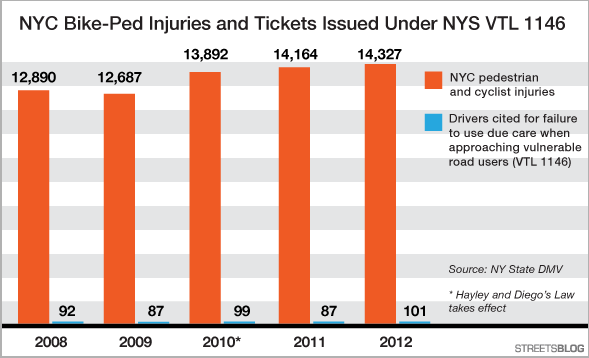
One of the most substantive traffic safety bills passed by the City Council Thursday was Intro 171 -- “Cooper’s Law” -- which allows the Taxi and Limousine Commission to suspend or revoke hack licenses of cab drivers who cause critical injury or death as a result of breaking traffic laws. The effectiveness of the law, however, depends on NYPD, which often does not ticket drivers involved in serious crashes.
The driver who killed Cooper Stock, the law's namesake, was cited for failure to yield. But the cab drivers who fatally struck Kelly Gordon and Timothy Keith, for example, were reportedly not summonsed for those crashes. Nor was the cabbie who severed the leg of Sian Green. Even with Cooper's Law in effect, all of those cab drivers would theoretically remain in good standing with the TLC.
It is too early to know whether NYPD is ticketing more drivers who injure and kill since the advent of Vision Zero, but another item on yesterday's agenda might be instructive. The council passed a resolution asking Albany to elevate violations of the state's vulnerable user law to misdemeanor status, which would let cops ticket drivers based on probable cause. NYPD has said it can't cite drivers for mere traffic violations unless an officer personally witnesses the incident.
Hayley and Diego's Law -- also named after children killed by a driver who avoided criminal charges -- was meant to give police a middle ground between a traffic violation and a crime. Because the department only issues careless driving citations if the crash is investigated by the Collision Investigation Squad, NYPD has for years failed to enforce the law as intended. As a result, fewer than 1 percent of New York City drivers who injure and kill pedestrians and cyclists are cited for careless driving.
Another potential hindrance is that NYPD investigates a fraction of serious traffic crashes. Though Ray Kelly purportedly retired the "likely to die" rule, only CIS personnel are trained to do more than check off boxes on the state-issued collision report form. In 2011 NYPD investigated just 304 of 3,192 fatal or serious collisions, according to the office of former comptroller John Liu. Even with reported additions to CIS, the unit has nowhere close to the staff it needs to properly investigate all serious crashes.
If NYPD limits enforcement of Cooper's Law to CIS-investigated collisions, or does not change its approach to traffic crashes in a meaningful way, dangerous cab drivers will remain on the job.





